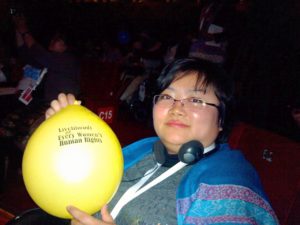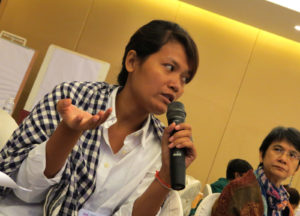

(Left Photo: Sun Jing, Right Photo: Sophea Chrek)
1. What issue-based advocacy have you been involved in since you were in the GEEJ-Asia workshop?
Sun Jing: My responsibility in Eco-Women is to contribute to the reduction of highly hazardous pesticide use and its risks. I do this through education, policy advocacy, as well as, actively promoting ecologically sound agriculture. Women and children are considered as high-risk groups as far as the ill effects of pesticide use in China is concerned. This is so because they have now become the principal labor force in the rural areas, as men increasingly migrate especially in the cities. I particularly target women’s knowledge and skills to improve their participation in the reduction of pesticide use, using a framework of sustainable and equitable development. We partner with them in understanding the risks on their health and well-being, as well as on their economic empowerment
Sophea: ASEAN Grassroots People’s Assembly (AGPA) is a platform from where we, the communities’ activists and feminists, demonstrate our human rights violation and demand real democracy in the ASEAN nation. “Making Human Rights and Democracy Real in ASEAN” was the main slogan we all are fighting for. We also demand t place “People’s Over Profit”. This slogan is designed to emphasize our feeling toward the current development agenda, which works in favors of private corporations and only a few powerful people. We are fighting to bring back our rights to livelihood, housing, access healthcare and education, to name just a few.
2. Have you been contact with any of the DAWN women or participants in a DAWN training? Or even in contact with some DAWN materials and resources, like the website? Has this been helpful to your continuing advocacy? In what ways?
Sun Jing: By participating in the DAWN GEEJ-Asia training in April 2012, I met young activists from China and other parts of Asia. Since then I continue to keep close contact with the DAWN women via DAWN GEEJ-Asia listserv, through which we share information and updates on analysis and advocacy. We also continuously receive DAWN publications and informaton. As GEEJ-Asia alumna, I was also invited to speak at a DAWN panel ” Gender, Economic Ecological Justice in a Fierce New World: Perspectives of Young Women from the South” at the AWID Forum 2012. The above activities and exposure help me and my colleagues at Eco-Women to understand the dynamics of the international women’s movement and link us with more feminist groups and partners.
Sophea: I have communicated with some DAWN participants, mostly through facebook and email. I feel personally close to some of them. Yes, I had visited DAWN websites several times. It is helpful, especially with the training preparation on women and globalization and campaigning at the global level.
3. Have you been involved at all in regional or global advocacy even outside of DAWN? How did DAWN help you achieve an understanding of local-global understanding of issues?
Sun Jing: I contribute to policy advocacy on reduction of use of highly hazardous pesticide both at the international and national levels. For example, I share research results with the Pesticide Action Network and conducting awareness raising training on the issue in the rural communities, and etc. Engaging in the DAWN training and advocacy helped me to better understand the inter-linkage of gender, economic and ecological justice in the global context and establish the contacts with the feminist activists across global South.
Sophea: I had been involved with a few regional alliances such as Focus on the Global South and the People’s Health Movement (PHM). With Focus on the Global South, the collaboration has been strong because of the AGPA network. Participation with DAWN provided me an opportunity to engage in the broader political discussions and negotiations. My first experience was getting involved in the global negotiation on Sustainable Development Conference or Rio + 20 in June 2012 and the Post 2015 Development Agenda Asia Pacific regional consultation in Bangkok in November 2012 that was convened by DAWN and UN Women.
